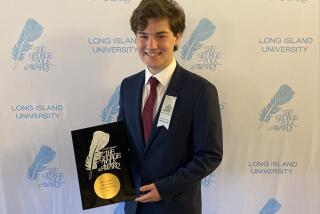Wit Makes Minutes That Don’t Seem to Take Hours
- Share via
STANFORD — With Arthur Coladarci wielding his pen as academic secretary, the minutes from the 21st Senate of the Academic Council at Stanford University no longer consist of coma-inducing verbiage.
Coladarci expunges dull minutes that begin “The meeting was called to order by . . . “ Rather, he lifts the job of taking minutes to a new literary and comical plane.
To wit: “(Chairman John) Kaplan rapped his gavel smartly at approximately 3:20 p.m., and all but an impish chemist responded appropriately--but he complied cheerfully with Kaplan’s personalized invitation to join the otherwise respectful assembly.”
Decided to Inject Fun
Coladarci, 71, a professor emeritus of psychology and education, said that when he began writing the minutes last fall, he set out to inject some fun into the official record of a body that decides a variety of academic issues.
“I have never been comfortable with the general assumption that minutes ought to be sober things,” Coladarci said. “Meetings are not only sober occasions. People are people and even the most serious discussions have in them a little irony, a little humor.”
He said he’s heard only compliments about his writing.
He does have detractors, however, who nevertheless insist on remaining anonymous.
“I think they are flippant,” one professor said. “Not that we have to take ourselves all that seriously . . . there’s a great deal of his own editorializing about matters. A person who takes notes should maintain some distance.”
Coladarci also has supporters, such as university President Donald Kennedy, who called the minutes “wonderful.”
“I suppose he tickles somebody the wrong way,” Kennedy said. “The literary quality is very high, and he keeps high morale in the staff and Senate.”
Another longtime Coladarci supporter is Nel Noddings, a professor of education.
“He did minutes for us at the school of education and they were even more fun,” she said. “He was less restrained. The minutes were always read.”
They Were Always Read
She noted that when Coladarci asks for additions, faculty members usually have suggestions, proving that the minutes are being read.
Witness this paragraph from the Dec. 1 minutes: “The Senate tacitly gave its secular absolution to the academic secretary for the venial misspelling of ‘tendentious’ in the draft version of the Nov. 10 minutes.”
When Coladarci was appointed academic secretary, he agreed to serve for two years.
“It’s a good arrangement for people in my age bracket,” he said. “Otherwise, administrators are put in the uncomfortable position of telling someone he’s decrepit.”
Excerpts from Coladarci’s minutes:
- “Confessing an ignorance probably held by many, Rebholz inquired about the meaning of the acronym ‘pro fro’ in the C-UAFA report. His intellectual hunger was sated by (Dean Jean) Fetter’s response: ‘prospective freshmen,’ but it was re-generated and re-satisfied by her comment that the committee employs, but mercifully omitted from the report, an even more arcane acronym, ‘Pro Fro Ho Pro,’ which signals ‘Prospective Freshman Host Programs.’ Rebholz smiled in admiration and then retreated. Fetter, however, continued to advance mercilessly with an explanation of that operation in which she alchemized the acronym noun into an ear-catching and dangerously suggestive verb; e.g., ‘We go Pro Fro-ing around the country.’ ”
- “P.S. The reward for those who read to the end is a bit of intelligence about our theory-constructing and theory-driven Department of Sociology. The 1895-96 catalogue includes the following course: Sociology 10. Principles of Household Management, 2 Hours, 2d semester. Lectures and assigned readings on domestic architecture, house decoration and furnishing, sanitation, food and dietaries, domestic labor, and household finance.
“O tempora! O mores!”
More to Read
Sign up for our Book Club newsletter
Get the latest news, events and more from the Los Angeles Times Book Club, and help us get L.A. reading and talking.
You may occasionally receive promotional content from the Los Angeles Times.










